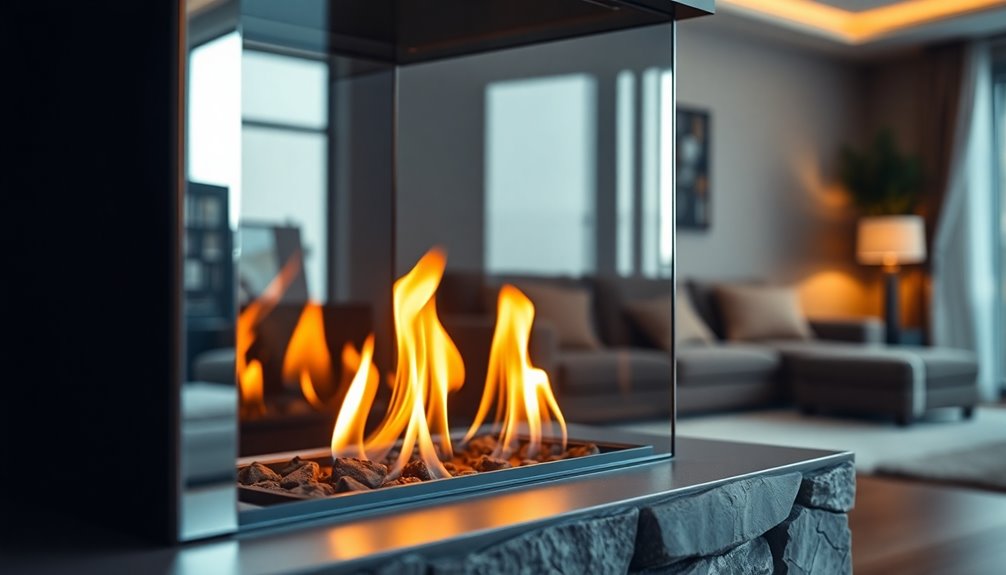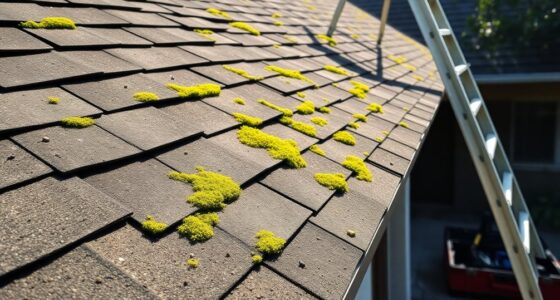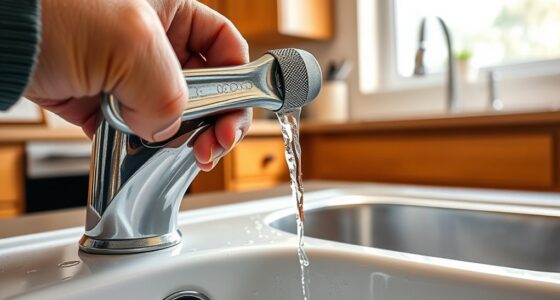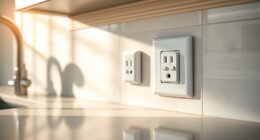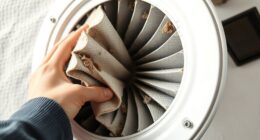Yes, you need to open the flue when using a gas fireplace, especially if it's a vented model. This guarantees that harmful combustion gases escape properly, preventing dangerous carbon monoxide buildup. Leaving the flue closed can create hazardous conditions and even lead to smoke intrusion. Always verify that the flue is fully open during operation for safe and efficient heating. For ventless models, this isn't necessary, but it's still good to understand your specific fireplace type. If you want more insights on maintaining your gas fireplace, you'll find helpful tips just ahead.
Key Takeaways
- Yes, you need to open the flue when using a vented gas fireplace to ensure proper exhaust of combustion gases.
- An open flue prevents carbon monoxide buildup, reducing the risk of hazardous conditions in your home.
- Vented fireplaces have a damper stop feature to maintain some airflow when not in use, enhancing safety.
- Regular inspections of the flue are essential to confirm its proper operation and prevent smoke intrusion issues.
- Always keep the flue open during operation to optimize heating efficiency and air quality in your living space.
Types of Gas Fireplaces
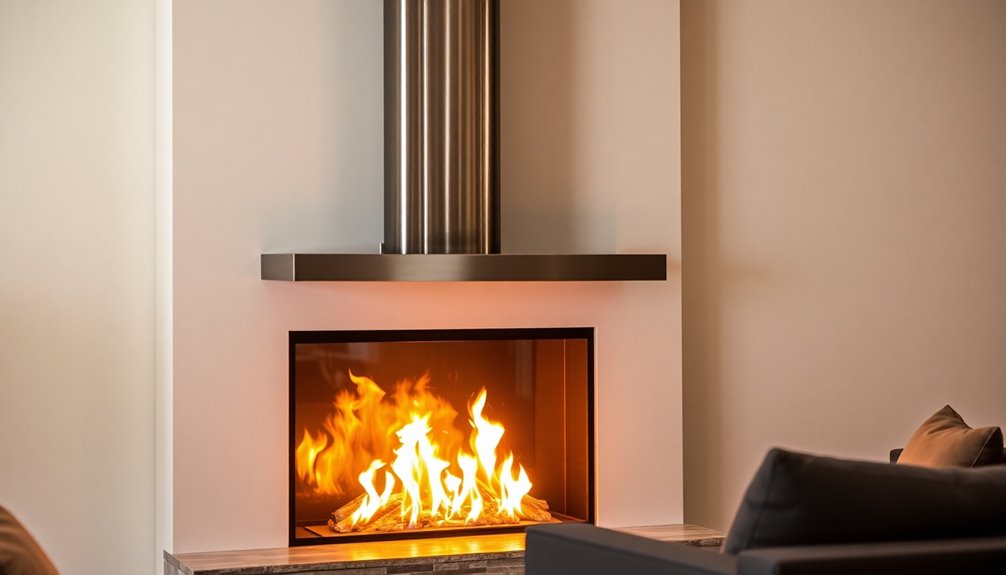
When choosing a gas fireplace, it's vital to understand the two main types: vented and ventless.
Vented gas fireplaces require an open flue during operation to safely expel combustion gases outside, which helps prevent carbon monoxide buildup in your home. These models usually come with an external vent box and may include a damper stop to guarantee proper ventilation even when they're not in use.
On the other hand, ventless gas fireplaces are designed to burn gas cleanly, releasing minimal emissions directly into the room, so they don't need an open flue.
Knowing the differences between vented and ventless gas fireplaces is essential for your safety and comfort, as each type has distinct operational requirements.
Importance of Flue Operation
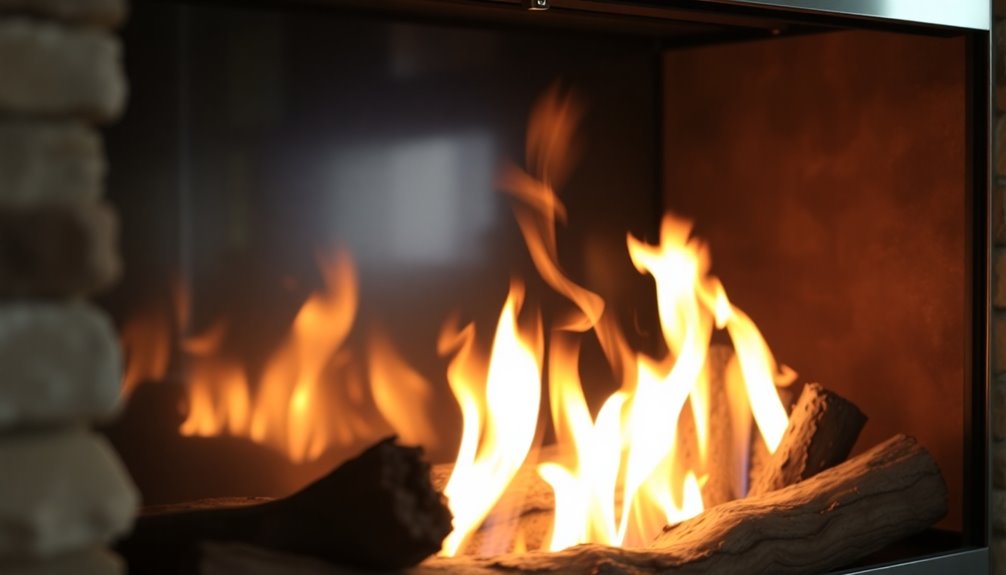
Ensuring the flue is open during the operation of your gas fireplace is essential for safety and efficiency. Proper flue operation allows exhaust gases to escape, preventing dangerous carbon monoxide buildup in your home.
If the flue is closed, it can create hazardous conditions that jeopardize your health and safety. Many vented gas fireplaces feature a damper stop designed to prevent complete closure, ensuring some airflow remains.
Regular inspection and maintenance of the flue are vital for confirming it's functioning correctly. By maintaining proper flue operation, you not only protect against carbon monoxide risks but also enhance the heating efficiency of your gas fireplace, allowing for adequate draft and a more effective heating experience.
Safety Considerations
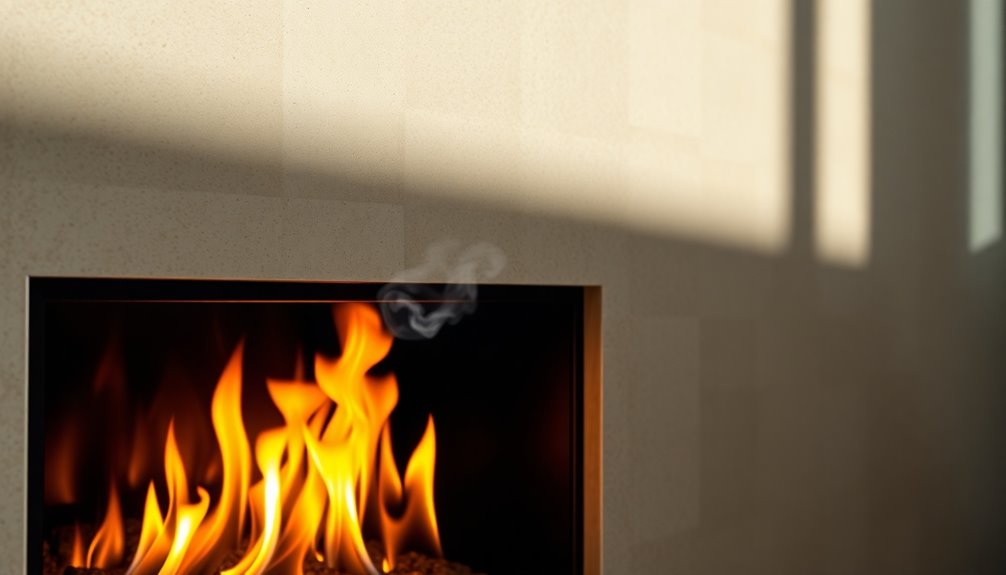
While enjoying the warmth of your gas fireplace, it's important to keep safety at the forefront. Always verify the flue is open to prevent hazardous carbon monoxide buildup. A closed flue can lead to smoke intrusion and even poisoning. Regular inspections of your flue's functionality are vital for safe operation. Some vented gas fireplaces come with a damper stop to avoid complete closure, emphasizing the significance of proper flue management. Always ventilate the area when using gas appliances to further mitigate risks. Additionally, maintaining good air quality is crucial for ensuring a safe and healthy environment while using gas appliances.
| Safety Tip | Description | Reminder |
|---|---|---|
| Open the flue | Prevents carbon monoxide buildup | Check before lighting fire |
| Regular inspections | Verify flue functionality | Schedule annually |
| Vent outside | Reduces smoke and harmful gases | Keep windows open |
| Monitor air quality | Assess ventilation levels | Use a CO detector |
| Know emergency signals | Recognize signs of carbon monoxide poisoning | Familiarize yourself |
User Experiences and Tips
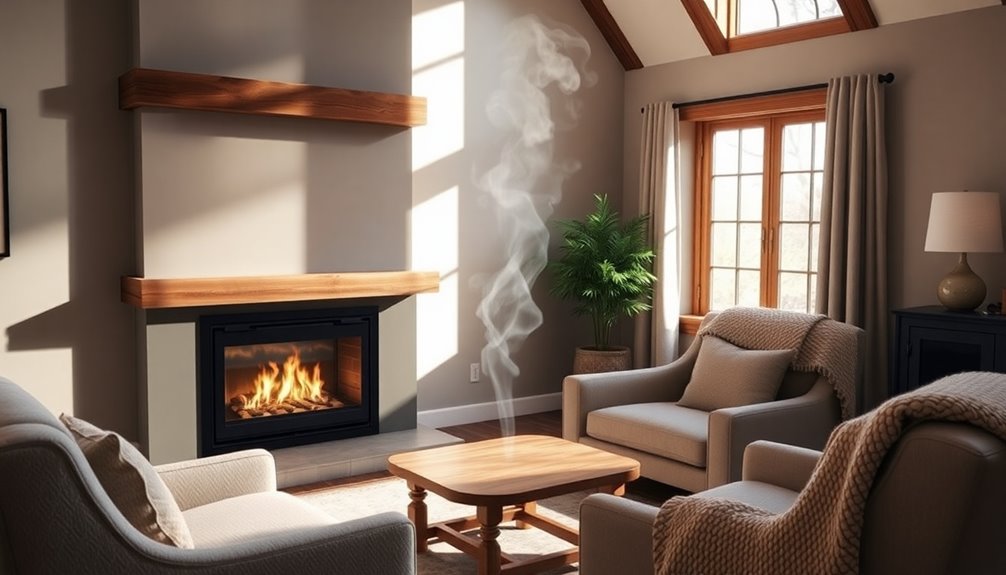
Many users of gas fireplaces have shared valuable insights that can enhance your experience and safety.
When using a vented gas fireplace, it's essential to keep the flue open during operation. This helps prevent carbon monoxide buildup and guarantees proper ventilation.
Users often express confusion between vented and ventless models, so take the time to familiarize yourself with your specific fireplace.
Regularly inspect and maintain the flue to avoid safety hazards and guarantee efficient operation.
Community advice suggests using clamps to keep dampers open during use, promoting ideal airflow.
Finally, make sure everyone in your household understands safe operation procedures to prevent accidents and enjoy your gas fireplace worry-free.
Maintenance Recommendations
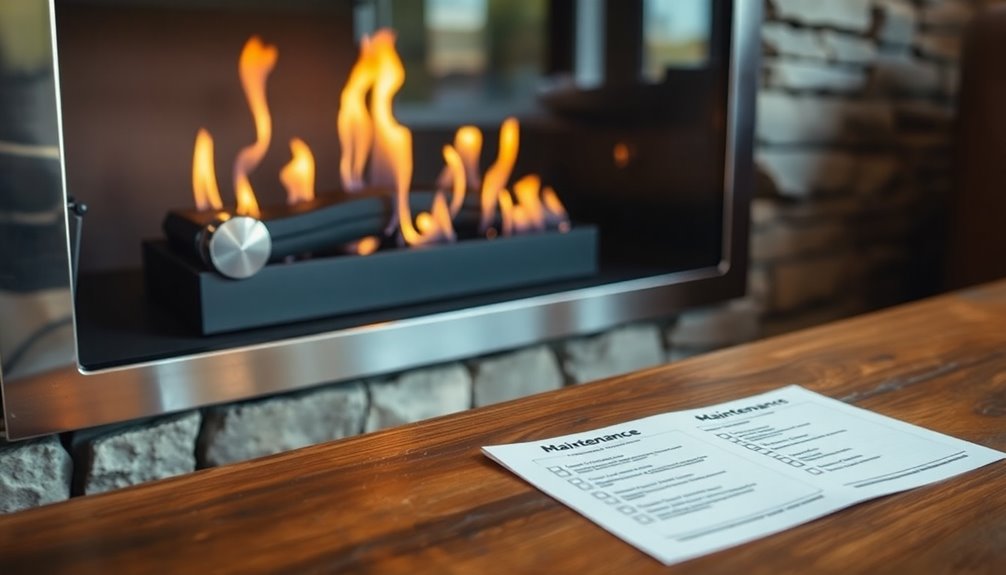
Proper maintenance of your gas fireplace is key to keeping it safe and efficient. Make certain to schedule an annual inspection of the flue to guarantee proper operation and prevent any blockages or damage that could compromise safety.
Always keep the flue fully open during use to avoid carbon monoxide buildup and confirm adequate ventilation. Clean the gas logs and surrounding areas regularly to enhance performance and prevent soot buildup, which can affect flue operation.
It's also crucial to educate all household members about maintaining proper flue settings and recognizing signs of potential issues, like smoke intrusion.
Frequently Asked Questions
What Happens if You Don't Open the Flue on a Gas Fireplace?
If you don't open the flue on your gas fireplace, you risk serious safety issues.
You could experience a buildup of carbon monoxide, leading to dangerous air quality in your home. Smoke might also enter your living space, causing respiratory problems.
Additionally, keeping the flue closed can damage your fireplace due to overheating, resulting in costly repairs.
Always guarantee proper ventilation to maintain both safety and efficiency while using your gas fireplace.
Does the Flue Have to Be Open on a Gas Fireplace?
Oh sure, why not just seal up your gas fireplace and turn it on? Who needs fresh air, right?
But seriously, if you've got a vented gas fireplace, you absolutely need to keep the flue open for safety. It allows harmful gases to escape, preventing potential disasters.
If you're using a ventless model, it's designed to operate without one. Always check your manual to avoid becoming a cautionary tale!
Do I Need to Open a Vent for My Gas Fireplace?
If you have a gas fireplace, whether you need to open a vent depends on the type.
For vented models, you should always open the vent during operation to guarantee proper airflow and prevent carbon monoxide buildup.
Ventless gas fireplaces don't require a vent, but they still produce some emissions, so you should exercise caution.
Regularly check your system to maintain safe operation, regardless of the type you have.
Is It OK to Close the Flue on a Gas Fireplace?
It's not okay to close the flue on a vented gas fireplace while it's in use.
Doing so can create dangerous conditions, like smoke buildup and carbon monoxide poisoning.
Make certain you keep the flue open for proper ventilation.
However, if you have a ventless gas fireplace, you don't need to worry about the flue.
Always check your manufacturer's guidelines for specifics about your fireplace model to guarantee safe operation.
Conclusion
In the dance of warmth and safety, remember to let the flue breathe. Whether you've got a cozy insert or a sleek vented model, opening the flue is like giving your fireplace a chance to exhale, ensuring smoke and gases find their way out. Embrace these small rituals, and your evenings will glow brighter, with peace of mind wrapped around you like a warm blanket. So, light that fire, but don't forget to let it sing!
